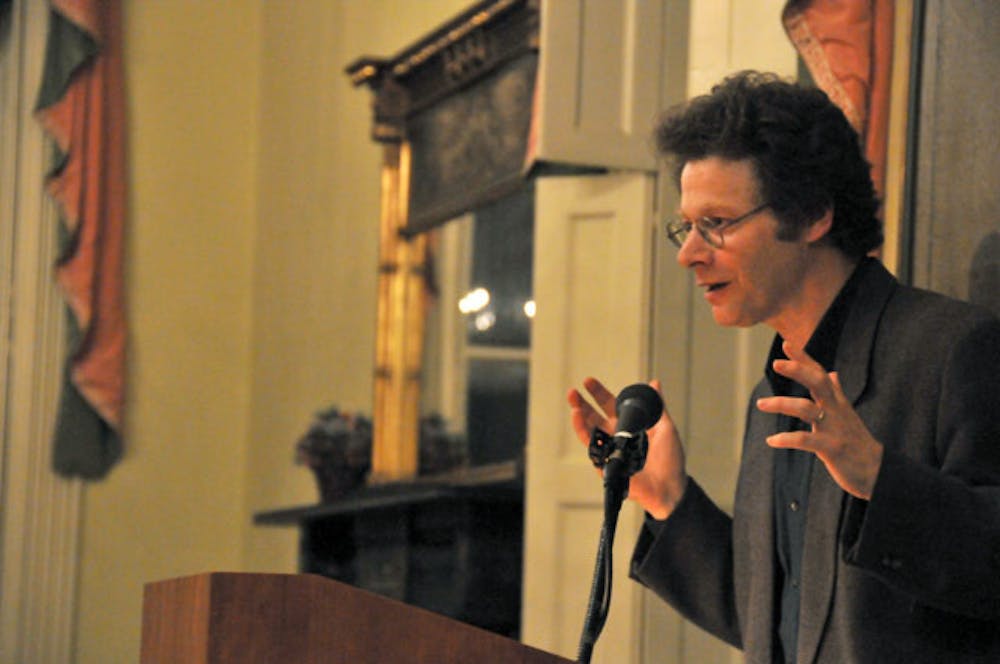Celebrities like Madonna may have helped popularize the general understandings of Kabbalah, but on Monday Oct. 22, a reading and lecture in the Abernethy Room in Axinn Center at Starr Library brought the long history of Jewish mysticism to light.
Sponsored by the program in Jewish studies, the department of religion and the department of English and American literatures, poet and translator Peter Cole spoke on and read from his new book The Poetry of Kabbalah.
A seasoned writer, in 2007 he received the MacArthur Fellowship award, or “Genius Grant,” given for exceptional merit for continued and enhanced creative work in addition to authoring four other books.
Cole is no stranger to the College. His first visit was in 2000, and he has since been a visiting winter term professor.
Curt and Else Silberman Professor of Jewish Studies Robert Schrine believes that Cole’s work is critical in introducing mystical materials to the English-speaking world.
“Aside from being a major contemporary poet, [Cole] has opened up the world of Hebrew poetry of late antiquity and the Middle Ages for the English-speaking world,” said Schrine. “For what it’s worth, I would say that his work gives the lie to the old adage — attributed to Frost — that poetry is what is lost in translation. In Cole’s hands, poetry is also gained in translation. I regard his work as a great gift to us professors of Jewish studies because I can engage students in the discussion of these liturgical and philosophical poems.”
The lecture focused primarily on the history of mystical poetry in the Jewish tradition.
Formed from Jewish thought in the 12th through the 13th century, the practice of Kabbalah focuses on what lies beyond the scripture, revealing a veil that aims to explain the relationship between the mysterious and the universe.
Cole explained that over the years, the practice has gained its fair share of skeptics, and oftentimes he is included, adding “[There is] a skeptic in me. I’m a poet, not a mystic.”
The lecture focused on the strong power of language in the Kabbalah tradition. Much of Cole’s professional work is translating the original poetry of Jewish mystics and combining their works into poetry anthologies.
In addition to his scholarly work, Cole is a poet himself, composing verse on similar topics.
Cole spoke of the importance of language in the tradition, calling Kabbalahists “language obsessed.” This feature of the tradition emphasizes the importance of his work in translation. Reading from what is believed to be the oldest texts from Palestine, Israel and Babylonia, many of the translated poems describe the desires and rituals of spiritual seekers to rise to heaven.
Many of the audience members were unfamiliar with Kabbalah, despite being educated in Jewish studies. Adina Marx-Arpadi ’13.5 went to a Jewish day school but did not have a background in this aspect of the Jewish tradition.
“[The lecture] revealed a whole new world of Judaism that I didn’t know much about,” said Marx-Arpadi. “I came because I was interested in how [mysticism] manifests contemporarily.”
Others came for their general interest in religion. Blake Harper ’15, a religion major, came to hear a new perspective on a topic he had previously studied.
“I don’t focus on Jewish studies, so it was really great to have that dimension,” said Harper. “But I do focus on studies in mysticism, so to hear about the Jewish tradition of that was really captivating. I think that there are some really exciting and clear differences you can see between these various mystical strands.”
Poet Removes Mystery Behind Kabbalah

Comments


